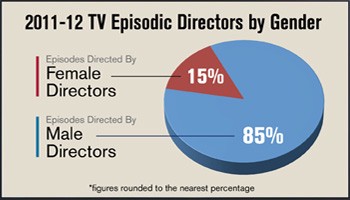In the 2014–2015 TV season, white women directed 13% of episodes and women of color directed 3%. Put another way, “Women are more than half of the American population, but they’re getting less than a sixth of the TV directing jobs,” writes critic Maureen Ryan in a comprehensive new piece in Variety on sexism in the small screen’s directing ranks. Men of color, too, have been historically underrepresented in Hollywood, but their numbers, at 15% of TV directors, is much closer to the 18–19% figure that they constitute in the U.S. White men make up 31% of the population, Ryan reminds us, but “they’ve gotten more than two-thirds of directing gigs — and at some cable networks, that number is closer to 80 or even 90 percent.”
Establishing and maintaining an even playing field for women isn’t impossible. Shonda Rhimes’ “Grey’s Anatomy,” notes Ryan, has hired nearly two dozen women-of-color helmers between 2010 to 2014. But Rhimes is, sadly, the exception as usual. According to a DGA study, 31% of shows in the 2013–2014 season had no female directors, and another 20% had less than 10%.
So what’s behind the institutional employment discrimination against women directors in TV? According to Ryan’s piece, it’s a constellation of conscious and unconscious biases that have resulted in fewer opportunities for female helmers, especially women of color. Many of the issues Ryan identifies are familiar to those well-versed in the Hollywood’s entrenched sexism, but the stories and testimonials the piece includes retain their ability to shock and dismay.
Here are some of the biggest obstacles to overcome in getting to that even playing field:
— Stereotypes about what a director looks like. Says director Laura Belsey, “As image creators, we know the power of images. The fact that a woman or person of color does not fit the archetypal idea of what a director looks like influences people more than they might know. … We are dealing with thousands of years of imagery that reinforce these concepts of what power looks like.”
— The shifting of blame: “Arrow” EP Wendy Mericle points out how diversity is always described as someone else’s responsibility: “Executive producers are like, ‘Well, I can’t get any agents to send [women and people of color] to me.’ Agents are like, ‘I can’t get these people approved by the network.’ The network is saying, ‘The studio won’t approve them.’ There’s a vicious cycle of people saying it’s somebody else’s fault.”
— Doing nothing about the status quo. Observes Ryan, “Given that many if not most showrunners and established TV directors are white men, if no effort is made to change the system, the status quo efficiently replicates itself. ‘It’s just inertia,’ says a senior network executive. ‘You have to be actually willing to expand the talent pool and give someone a crack.’”
— The difficulty of breaking in. “Empire” showrunner Ilene Chaiken says, “It’s that classic Catch-22 that plagues us in the television business. … “You can’t do [TV] unless you’ve already done it.” And yet, those prerequisites of experience among women and people of color seem to disappear for white men. “If qualifications are a big concern, why is a showrunner bringing over a British guy who has done one commercial?” Lexi Alexander asks. “There are so many people who are clearly willing take more chances on white guys, whether it’s crew members or actors in the cast or a guy who did a cool indie film.”
— The ineffectiveness and hidden costs of shadowing programs. Many TV shows have some limited opportunities for experienced women and people of color to shadow directors, but those weeks spent on set can feel like a waste of time and energy when there’s no guaranteed job at the end of the program. One of Ryan’s interviewees recalls the $3000 she spent shadowing on a TV show for two weeks: “It’s costing me money and we’re already not making money. … I’m thinking, ‘How is someone who has been sidelined for years going to afford this?’ I have women director friends who are losing their houses.”
— Perceived scarcity of female and racially diverse helmers. “Homeland” EP Lesli Linka Glatter reveals, “I hear way too often, ‘Well, there are just no women directors. It’s just not true. … Maybe there’s a handful of people that get hired all the time, but you have to look a little harder than that and they’re there.”
— Lack of recognition that a diversity of voices and perspectives matter. Greater inclusion and representation are, of course, a “pro-social” thing, as Gary S. Levine, president of Showtime, puts it. But audiences both at home and abroad are only becoming more diverse, which means that Hollywood has to keep up as a matter of survival. “We need to refresh that talent pool to fill our slots for directors,” argued Levine. “The more we are out there looking for new people to introduce to the Showtime producers — I think automatically the diversity picture changes when you do that.”
Added Chaiken, “Telling new stories with new voices and diversity and representation and exciting voices that haven’t been heard is what’s going to make really good, dynamic television.”
[via Variety]






